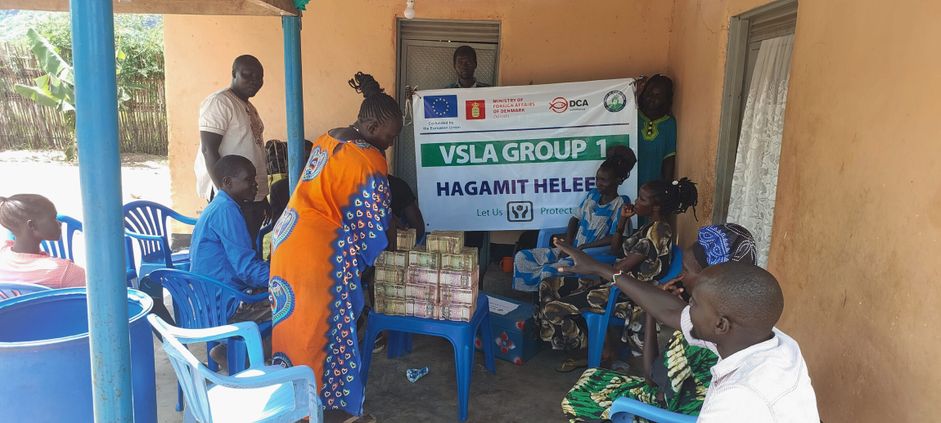12 years after dropping out of school at 13 to give birth, 25-year-old Irene Apule recently got a second chance at a business training that inspired her to open a restaurant. She wants to chart a new course for her family and give her children better opportunities for the future.
Irene Apule sits under a tree on a blue plastic chair next to a blue plastic table decorated with all the letters of the alphabet. On the table there’s a transparent plastic bucket with fried, sweet bread – mandazis – and a couple of South Sudanese pound notes rolled up next to it.
Behind her is a basic clay structure with an awning made of thin metal sheets – two young men are sitting under it in the shade. It’s midday in Chukudum – capital in Budi County in south-east South Sudan – and it’s hot.

“I used to sit by the roadside and sell mandazis – but now I have opened this restaurant. It’s called Irene’s Restaurant. I only opened a week ago and so far, it is going well. I still want to improve and make it better – but I have already added beans to the menu. I can make them here,” says Irene.
As she’s talking a young boy walks up to the table. In one hand he’s holding a role of darkened, extensively used pound notes. He opens the lid to the bucket and sticks the other hand in and starts going through the mandazis one by one to find the right one to satisfy his sweet tooth. Irene leans forward and pulls his arm gently away from the mandazis – as he turns his head and looks at her, she glances purposefully at the tweezers in the bucket. He picks them up and continues his search with the tweezers – and Irene adds; “I also need to improve on the hygiene.”
From business training to restaurant owner
25-year-old Irene Apule is one of 50 young people from Chukudum in south-east South Sudan who participated in a business training organised by the South Sudanese NGO Root of Generations (RoG) in September 2024.
She was immediately inspired by the idea of starting her own business – and she more or less walked out of the training and into Irene’s Restaurant.
“The training was very good and a big help in starting this business,” says Irene. She has started with a basic setup, but her plan is to expand: “I want to make this place inviting. I want the hygiene to be good, I want a tank for water so people can wash hands, and I want more chairs outside so people can come here and sit while they eat.”

Irene’s Restaurant feeds patrons – and the family
Irene has the full support of her husband who has helped clean up the place so she could get started. Her husband doesn’t have a job. And they need an income – they are only in their mid-twenties, but they already have four children to feed and look after.
“I want my kids to go to school so they can have opportunities and stand on their own,” says Irene and adds that she never managed to finish school herself.
“I left school in class 8. We didn’t have money for me to continue my studies. And I got pregnant,” she explains.
Teenage pregnancies more a rule than exception
Irene gave birth to her first child at the age of 13. So, at 25 her oldest is about to enter teenagehood. The same age Irene was when she got pregnant – like many other girls in Chukudum.
“The challenge we are facing in Chukudum is that there are no opportunities for young people. They get bored and the boys start drinking alcohol. And many girls fall pregnant,” says Irene and adds that the young men end up taking more wives – co-wives

“I left school in class 8. We didn’t have money for me to continue my studies. And I got pregnant.”
“I think it’s better to team up as a unit. One man and one woman,” says Irene. Irene moved in with her husband when she found out she was pregnant with their first child – and they remain a unit, she stresses.
Business beats farming and fighting
Now, with Irene’s Restaurant they have a potential source of income and an opportunity to make a difference for themselves and their children. Irene highlights that farming has become more difficult to rely on with the changes in the weather – and that those who opt to be warriors add to the level of insecurity and conflict in the area. She wants none of those things for her family – she believes that starting a business is a safer and more profitable way to go.

“Business is not impossible, but it requires determination”
“Many in Chukudum have doubts about opening a business – what I have learned is that business is not impossible, but it requires determination,” says Irene.
And with what she has achieved in such a short space of time, it is clear that neither mandazis nor determination are in short supply at Irene’s Restaurant.
Business support from SPREAD
Irene Apule participated in a one-week-long business training offered by Root of Generations under the regional, EU funded SPREAD project that targets people in the borderlands between South Sudan, Kenya, and Ethiopia.
About SPREAD
- Exact/full title: Strengthening integrated Peace, Resilience and Disaster Risk Reduction for cross-border communities in the Karamoja Cluster
- Period: February 2024 – January 2027
- Partner(s): SaferWorld, ROG, ICPDO, ECC, APAD
- Amount: 14,000,000 EURO
- Target of 80,000 people reached by end of project
- Donor(s): EU & Danish Ministry of Foreign Affairs.




![Nakale Loynach [Captured In the middle], the leader of the Ala Kara Village Savings and Loan Association (VSLA)](https://imgproxy.byhand.nu/imgproxy/ro05gilHjX0rOi-Xkf5kVnt3imPYgxeWm50cVUXp8zA/rt:fill/w:939/h:626/g:fp:0.5:0.5/el:0/cb:12345/q:80/aHR0cHM6Ly93d3cuZGFuY2h1cmNoYWlkLm9yZy93cC1jb250ZW50L3VwbG9hZHMvc2l0ZXMvMi8yMDI1LzEwL2ltZy0yNzQ0LXNjYWxlZC5qcGc.jpg)
